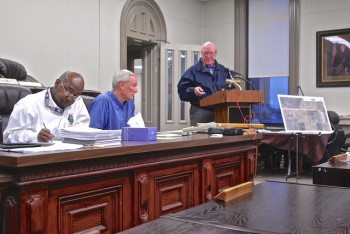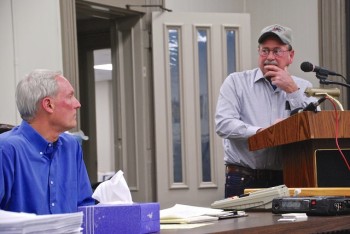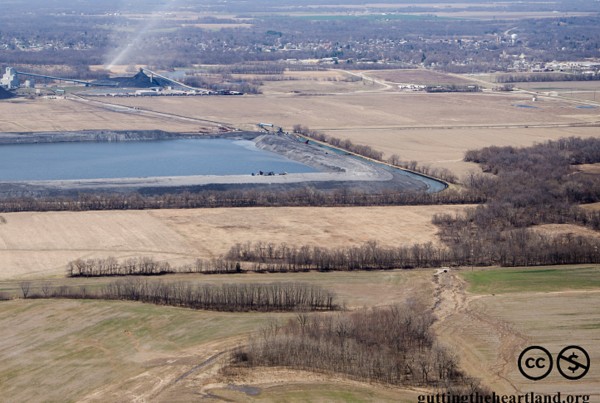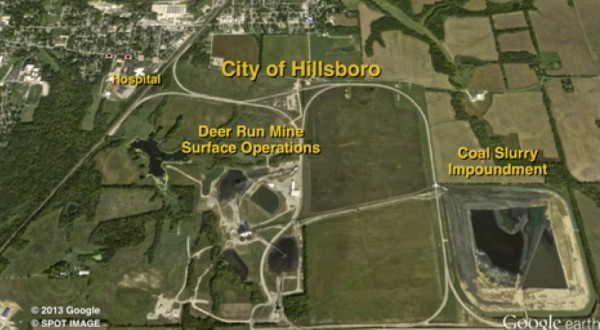
William Schroeder, a landowner concerned by the proposed expansion area, addresses Scott Fowler (rt) and Cliff Johnson, Land Reclamation Specialist, about the lack of a formulated plan to handle the drainage issues of subsided land with no timeframe for reclamation. William questioned how the subsidence of each sunken panel going north to south could be corrected when each time there is a hill to overcome. Mr. Fowler agreed that the situation is more difficult.
Nearly fifty concerned citizens, local officials and area farmers attended the February 11th “Informal Conference” held by the Illinois Department of Natural Resources Office of Mines and Minerals in Hillsboro at the Montgomery County Historic Courthouse.
Hillsboro Energy, LLC has submitted an application for a Significant Revision No. 2 to Permit 399 for Deer Run Mine.

Scott Fowler, Division Manager and Hearing Officer for the Informal Conference, listens to Larry Schraut at the podium. Larry farms land that is located in the shadow area in both the original and proposed expansion of Deer Run Mine. He questioned why IDNR/OMM would approve an expansion when they don’t know if the subsided land with drainage problems can be reclaimed as documented by the little progress that has been made on correcting the sunken areas of panels 1 and 2 after several years. Mr. Fowler commented that as long as the mine is fulfilling the obligations of its current permit, it has an opportunity to be able to expand its mining area.
An “Informal Conference” is supposed to be an opportunity for questions and answers regarding a new coal mine permit application, revision, or renewal. Per the federal Surface Mining Control, Reclamation and Enforcement Act an Informal Conference can serve to answer questions regarding a new mine permit so there is no need for a Public Hearing on the application.

Scott Fowler, Division Manager, Office of Mines and Minerals, IDNR and Hearing Officer for the Informal Conference.
Needless to say, citizens have also requested a Public Hearing as many of their questions were not answered. The Public Hearing has been scheduled by Illinois Department of Natural Resources, Office of Mines and Minerals on March 24th at 5 p.m. at the Montgomery County Historic Courthouse.
Below are some key issues and concerns raised at the Informal Conference:
1. In spite of being shut down due to an ongoing underground mine fire, the mine has applied for a 7,731.8 acre expansion for underground mining in the shadow area. This huge increase in available coal mining area is nearly double the size of the originally permitted underground mining area. Thousands of acres of prime flat farmland are included in this longwall mining application and hence will be subject to subsidence if this new permit is approved.
2. If Deer Run Mine is expanded, there was a request not to use the 2 existing impoundments for storage of coal waste. The two slurry impoundments upon failure would damage Hillsboro Lake and many homes and businesses as shown by the inundation maps.
3. Many citizens were concerned about water resources being contaminated and compromised to the extent that the stream could not be used for cattle or wildlife. After coal has been mined for 5 years at Deer Run Mine, surface waters around Deer Run Mine are contaminated as indicated by their high conductivity.
4. The mine also proposes to subside (drop the surface of the land unevenly four to six feet with permanent earthquake-like impacts) on the western edges of Coffeen Lake, which is an IDNR Fish and Wildlife area. Bear Creek and McDavid Branch will also be subsided. Although there will be material damage to water resources and farmland from subsidence, there is no additional bonding planned for the proposed expansion at Deer Run Mine.
5. Local farmers expressed again their concerns about long-term drainage problems and they questioned how subsided farmland would be reclaimed. It became apparent that there is no formulated plan on how the water drainage on subsided land would be handled and certainly no timeframe for completion.
6. Area citizens have worries that the mine processing plant producing air pollution and causing health risks would only be prolonged with an expansion. There is no change with the expansion in the lifetime air permit which does not monitor air on or off the mine site. Residents have endured coal dust, fumes, and noxious odors and these unhealthy events would be increased with the additional 7,731.8 acres.
7. With an approved expansion, the mine will be able to extract coal for several decades as long as Hillsboro Energy, LLC renews the permit every 5 years. The fiscal solvency of Deer Run Mine was questioned. There were worries about who would pay future costs of reclamation after the mine closes.
8. The potential of longwall mining under the land will lower area property values and quality of life. Many of the mineral rights of landowners were severed years, decades, or even a century ago from their surface land. The rights of landowners are superseded by the rights of Deer Run Mine.
Excerpts of citizen testimony and state agency responses are at the video link below, thanks to the work of Pam and Lan Richart of Eco-Justice, Champaign, Illinois.



